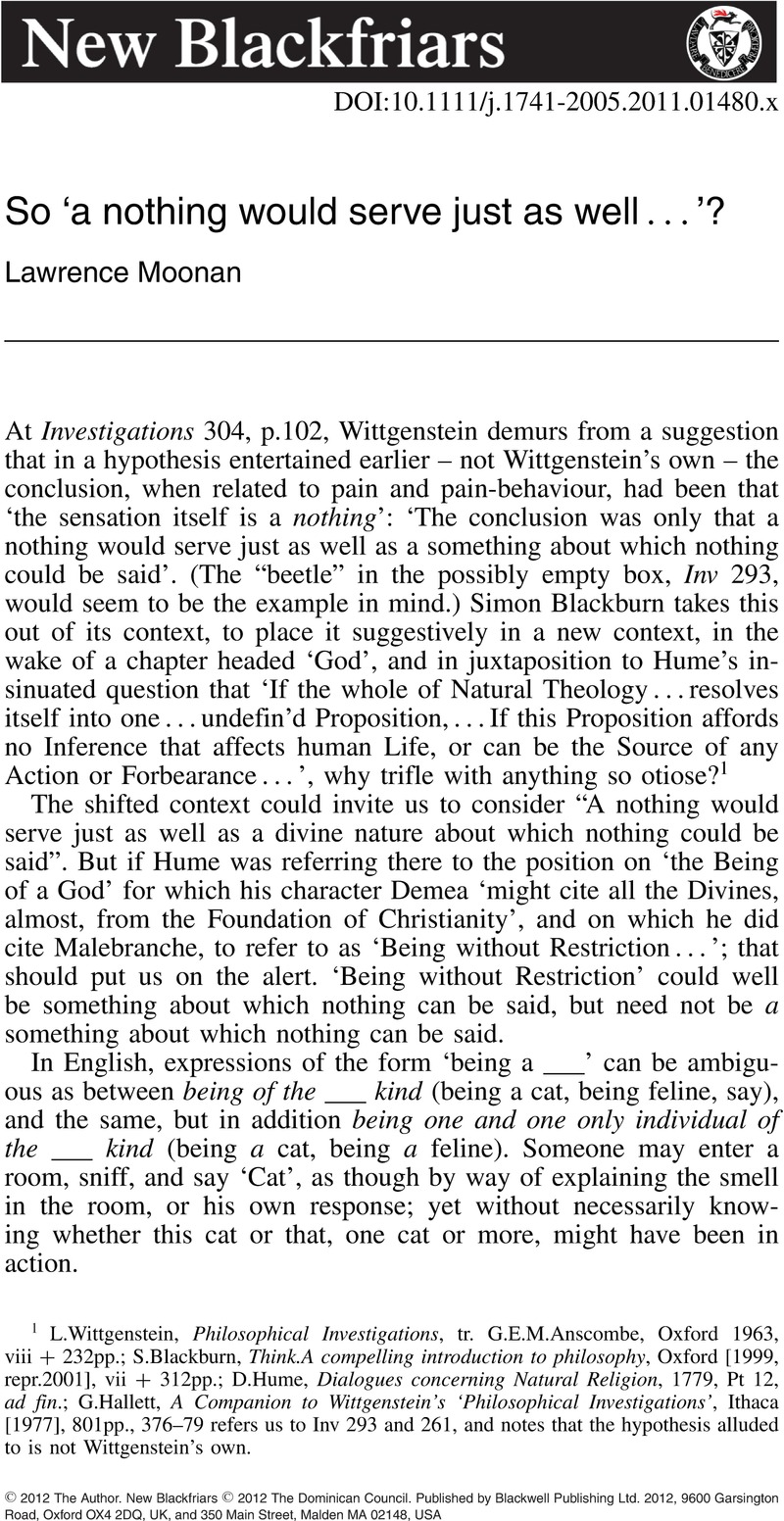No CrossRef data available.
Article contents
So ‘a nothing would serve just as well … ’?
Published online by Cambridge University Press: 01 January 2024
Abstract

- Type
- Original Article
- Information
- Copyright
- Copyright © 2012 The Author. New Blackfriars © 2012 The Dominican Council
References
1 Wittgenstein, L., Philosophical Investigations, tr. Anscombe, G.E.M., Oxford 1963, viii + 232pp.Google Scholar; Blackburn, S., Think.A compelling introduction to philosophy, Oxford [1999, repr.2001]Google Scholar, vii + 312pp.; D.Hume, Dialogues concerning Natural Religion, 1779, Pt 12, ad fin.; G.Hallett, A Companion to Wittgenstein's ‘Philosophical Investigations’, Ithaca [1977], 801pp., 376–79 refers us to Inv 293 and 261, and notes that the hypothesis alluded to is not Wittgenstein's own.
2 In a ms. from 1949, cited at Hallett 1977, p.427, Wittgenstein expressly allows: ‘That the essence of God guarantees his existence – that really means that here there is no question of existence’.
3 Hume, Dialogues Pt 12.
4 In Aquinas, for example: ‘When … “God is good” is being said, the sense is not “God is the cause of goodness”, or “God is not evil”; but the sense is “That which we say to be goodness in creatures, prae-exists in God” … [i.e, without limitation, and indistinctly from the strictly infinite divine nature supposed]’ (Summa theologiae 1/13/2c, and cf. 1/13/6c). See ‘What analogy and the Five Ways are meant to do for Aquinas's Summa theologiae’, forthcoming.
5 Or everything around us, if it is to be viewed not merely as a sum of things, but in addition as an ultimately unfailingly ordered totality of things: ‘for how is there to be order unless there is something eternal and independent and permanent’ (Aristotle, Metaphysics XI,1, 1060a25, tr. Oxford rev. Barnes, Princeton 1984, 2 vols); as anything strictly infinite could not fail to be.
6 It may sound odd to speak of anything's being non-necessarily known as an existent by God. The idea, expressed in a less compressed manner, is as follows. If ‘God’ stands for something not finite in any way, anything other than God exists non-necessarily, if it does; and can be known as an existent only if it exists. If this tree exists, then it is true of the tree, considered concretely, as in fact instantiated or not, that necessarily it is known as an existent by God. But if this tree, considered in its intrinsic nature, prescinding from whether it exists or not, in fact exists only through non-necessary ontological dependence on God, it is contingent that the tree exists so as to be necessarily known as an existent by God. It is in that way that it can be said to be known non-necessarily by God. The same tree, if considered abstractly, in its intrinsic nature, and prescinding from whether it is (to be) instantiated or not in extra-mental reality, is necessarily known as a thing of the kind it is by God. But that is true, if true, of the thing's being of the kind it is, which is not a contingent matter. Being known as a thing of the kind it is by God, is the same as being known indistinctly from the incomprehensible divine nature (supposed opaque to us), by God's knowing himself. Some of Demea's Divines in such a way distinguished what is known to God in his scientia visionis (what is known, if it non-necessarily exists), and what is known to God in his scientia simplicis intelligentiae (what is known as “prae-existing” without limitation, indistinctly from the divine nature).
7 See chs 2–4 of Infinite God: The central issues addressed by existence-theism, forthcoming.
8 Cit Hallet 1977, 427 from mss related to Investigations 373.
9 Always supposing that, within such a system, there could be any genuine argument, and not mere necessitated noise-sequences or shape-sequences of some kind, which might happen to look or sound like what we could not but take to be arguments, in our delusion – if it could be as much as a genuine delusion.




